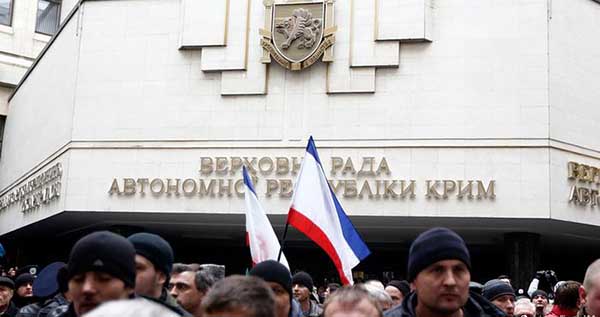BRUSSELS - European Union member states have agreed the wording of sanctions on Russia, including travel restrictions and asset freezes against those responsible for violating the sovereignty of Ukraine, according to a draft document reviewed by Reuters.
The seven-page document describes in detail the restrictive measures to be taken against Moscow if it does not reverse course in Crimea and start to engage with international mediators on efforts to resolve the crisis.
If approved by EU foreign ministers at a meeting on Monday, they would be the first sanctions imposed by the European Union against Russia since the end of the Cold War, marking a severe deterioration in East-West relations.
The measures are being coordinated with the United States, Switzerland, Turkey, Japan and Canada, an effort to ensure the sanctions net is as tight and effective as possible.
"Member states shall take the necessary measures to prevent the entry into, or transit through, their territories of the natural persons responsible for actions which undermine or threaten the territorial integrity, sovereignty and independence of Ukraine," reads Article 1 of the document.
The second article covers assets held in the European Union and states that "all funds and economic resources belonging to, owned, held or controlled" by those responsible for actions which have undermined Ukraine's integrity "shall be frozen".
The document was approved by what is known as a silence procedure after none of the EU's member states raised objections to the wording by 1100 GMT on Wednesday, officials said.
EU foreign ministers meet in Brussels on Monday and are expected formally to sign off on the restrictions, unless there is a dramatic change of course by Russia. That seems unlikely, with no indication of a 'de-escalation' in Crimea.
A referendum in Crimea to be held on Sunday is expected to see the region vote in favor of secession from Ukraine to join Russia, adding weight to calls for an international response.
In a statement, the leaders of the G7 - the United States, Britain, France, Germany, Italy, Japan and Canada - called on Russia to stop the referendum from taking place and said they would not recognize the outcome if it did.
"In addition to its impact on the unity, sovereignty and territorial integrity of Ukraine, the annexation of Crimea could have grave implications for the legal order that protects the unity and sovereignty of all states," they said.
"Should the Russian Federation take such a step, we will take further action, individually and collectively."
While the EU has agreed the wording for its sanctions, it is still working on the names of those to be targeted.
Discussions took place in London on Tuesday, when officials from Britain, the United States, Italy, France, Germany, Poland, Switzerland, Turkey and Japan met to discuss potential targets.
"My understanding is that there was detailed discussion of names at the meeting," an EU official said. "No definitive list has been drawn up, but it will be ready by Monday."
European officials have indicated that Russian President Vladimir Putin and his foreign minister, Sergei Lavrov, will not be on the list, so that channels of communication can be kept open and further escalation is possible at a later date.
Instead the list - an annex to the sanctions document seen by Reuters - is expected to focus on targets close to Putin in the security services and military establishment as well as on prominent members of the Russian parliament.
In the past, EU sanctions against countries such as Syria, Libya and Iran have started with a list of around 20 people and entities linked to them, although Russia is a far larger country with more complex interconnections with the EU.
"The annex shall also contain, where available, the information necessary to identify the natural or legal persons, entities or bodies concerned," reads the sanctions document.
"With regard to legal persons and entities, such information may include names, place and date of registration, registration number and place of business."
While there appears to be firm determination in Europe to move to sanctions at this point, including in Germany which had expressed reservations as recently as last week, there are concerns about potential retaliatory steps by Russia.
Not only does the EU rely on Russia for around 30 percent of its energy imports, there are vast investments by European businesses and lending by European banks into Russia that could easily be targeted by Russian authorities.
The EU has foreign direct investment worth approximately 170 billion euros in Russia and close trade ties: the total value of trade was 335 billion euros in 2012.
Despite the risks sanctions may bring, EU diplomats say they believe it is the only way to pressure Moscow into talks.
If Russia does not respond to the pressure, the EU has said it is prepared to take further steps, probably involving an arms embargo and other trade-related measures. It could also apply sanctions on Putin himself.
The crisis began after Russia moved troops into Crimea in late February and effectively seized the peninsula after the popular overthrow of former president Viktor Yanukovich, an ally of Moscow who is now in exile in Russia. (Reuters)

